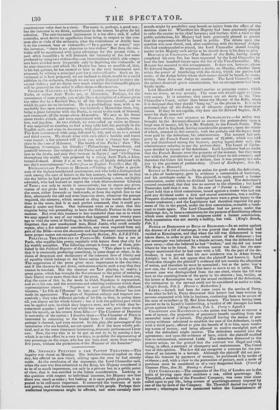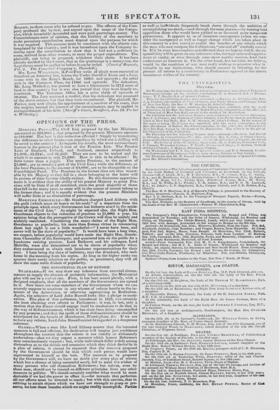,MR. 'ARNOLD'S PETITION V. THE PATENT THEATRES.—This
inquiry was closed on Monday. The Solicitor-General replied on that day, but offered no new views, relying upon the case he had already made. At the conclusion of the argument, the Lord Chancellor said, when the case was first submitted to the King, his Majesty considered it to be of so much importance, not only in a private but in a public point of view, that it was entitled to the fullest consideration. Looking at the question with respect to individual interests, his Majesty saw that there was much at stake ; but looking at it upon public grounds, it ap- peared to be still more important. It concerned the interests of taste and genius, and of the innocent amusement of his people. Perhaps their ntellectnal improvement might be affected, and most certainly their
morals might by possibility reap benefit or injury from the effect of the
decision come to. Wherefore his Majesty had been graciously pleased to refer the matter to his chief lawyers ; and further, with a vietv to the public satisfaction, his Majesty had been graciously pleased to permit that the arguments should be heard in public. The debate upon the question was now closed, and, after conferring with the learned Judges who had condescended to attend, the Lord Chancellor should humbly tender to his Majesty such advice as he should deem it his duty to give.
PESPATCII IN CIIANCERY.—The Master of the Rolls, having nearly completed his own list, has been requested by the Lord Chancellor to
hear the last hundred causes upon the list of the Vice-Chancellor. His Honour has assented to this arrangement. It does not, however, please Sir Edward Sugdeu. He'expressecl a doubt, on Monday, whether there exists the power of interfering with the choice, which the parties had made, of the Judge before whom their causes should be heard, by trans- ferring them from one Judge to another. The Lord Chancellor said the subject deserved grave consideration, but no arrangement had been finally made. Lord Mansfield would not permit parties to postpone causes, which were set down, on any account. The same rule should apply to Chan-
cery causes. It is notorious that causes are set down in the Vice- Chancellor's Court, rather than before the Master of the Rolls, when it is designed that they should "hang up," as the phrase is. It is to be presumed that all the Judges are of adequate capacity to determine causes. If they be not capable, why does not Sir Edward Sugden, M.P. move for their removal ?
FOREIGN FUNDS NOT SUBJECT TO PROBATE-BUM—An action was brought by the Attorney-General to recover the probate-duty upon a
large sum of money, left by a Mr. Penfield, in the French Funds. The testator died in England, leaving considerable property ; upon the whole of which, situated in this country, both the probate and the legacy duty were paid by the defendant, his administrator. The testator had pro-
pry in the French Funds to the amount of 37,0001., which was sold out and distributed among the legatees, paying legacy-duty only, the
administrator refusing to pay the probate-duty. The Court of Exche- quer decided in favour of the defendant. Lord Lyndhurst had no doubt that the French Rentes were the property of the testator, but they were
not within the jurisdiction of any Spiritual Court in this country; and therefore the Court felt bound to declare, that it was property not sub- ject to the payment of probate-duty. (Court of Exchequer, Jan. 31. The King v. Dimond) EFFECT OF BANKRUPTCY.—In an action for goods sold, the defendant, on a plea of bankruptcy, gave in evidence a commission of bankrupt,
and his certificate under it. The plaintiff, in reply, proved a former commission, under which no dividend had been paid. The defendant's counsel contended, that that was no answer to the objection ; but Lord Tenterden held that it was. In the case of "Fowler v. Coster," the Court held that a third commission, issued against a trader who had not paid any dividend under a first and second commission, was a nullity. Frequent discharges under the bankrupt-laws were a great injury to the honest tradesman ; and the Legislature had therefore required the pay- ment of 15s. in the pound, under the first commission, to enable a bank-
rupt to trade again. The Lord Chancellor had no power, under the Bankrupt Act, to issue a commission for the purpose of distributing effects which were already vested in assignees under a former commission. Such commission was not merely a nullity, but void. (King's Bench, Feb. I.) NOTICE OF Disnonoua Or BILLS OF EXCHANGE.—III an action against the drawer of a bill of exchange, it was proved that the defendant had
resided at Bennington, and that when the bill was dishonoured it was taken there, in order to give him verbal notice of the dishonour ; but the messenger was informed by a female servant, that the defendant had gone away,—that she believed he had "broken," and she did not know
where he was to be found. No written notice was left ; but the mes- senger mentioned that he had come with a bill. On the part of the de- fendant, it was proved that his new, residence was in Adam Street,
Adelphi; but it did not appear that the plaintiff had known it. Lord Tenterden thought the plaintiff's evidence did not sustain the allegation of notice, and therefore he must be nonsuited ; but as the point was' a new one, the Court would give him leave to move to set it aside. The present case was distinguished from the one cited, where the bill was
sent to the counting-house of the party in his absence ; but, besides, as the house at Kennington was not the actual residence of the defendant, the intimation to the servant could not be considered as notice to him. (King's Bench, Feb. 2. Harris v. Richardson.) LIBEL.—Lynch had been for some years in the service of Perry. Soon after be left it, Perry discovered that letters had been written to persons connected with him in business, cautioning them to be au-are of the nest of swindlers at 37, Red Lion Square. The letters having been proved to be in Lynch's handwriting, a verdict of 50/. damages has been given against him. (King's Bench, Feb. 3. Perry v. Lynch.) CUAXPERTY AND 111AusraNaNcs.—An action was brought to recover a sum of money, the proportion of pecuniary benefit resulting from the
successful issue of a lawsuit. The plaintiff having the means of pro- curing evidence calculated to establish the case of the defendant, in suit with a third party, offered to give the benefit of it to him, upon receiv- ing a sum of money, and being allowed to receive one-eighth part of
what the defendant might recover. The defendant entered into the agreement; and upon the evidence of facts, which the plaintiff enabled him to substantiate, recovered 14001. The defendant demurred to the present action, on the ground that the contract was illegal and void, being, in effect, a contract of champerty and maintenance. The Court was of this opinion. The law did not recognize a contract for the pur- chase of an interest in a lawsuit. Although the plaintiff did not pur- chase his interest by payment of money, he purchased it by tender of evidence ; and, with a view to the prevention of perjury, such a mode of purchase must be considered as of a very dangerous kind. (Court of Common Pleas, Jan. 31. Stanley v. Jones) CITY COMPANIES.—The companies of the City of London are in the habit of levying upon their members a tax, called quarterage. Mr. Thornhill, a member of the Founders' Company, was some time since called upon to pay 18s., being arrears of quarterage.money imposed by one of the by-laws of the Company. Mr. Thornhill denied the right to recover ; whereupon he was summoned before the Commissioners a equeSt, to show cause why he refused to pay. The officers of the Com- pany produced the by-law, and argued upon the usage of the Compa- nies, which invariably demanded and were paid quarterage-money. The Commissioners were of opinion, that the liability of the members to make pecuniary contribution must depend upon the purpose for which it was required. This purpose must be consistent with the objects con- templated by the charter ; and it was incumbent upon the Company in- sisting upon the contribution to show that it had not a sufficient in- come, derived from other sources, to meet the proper expenditure. The plaintiffs, not being so prepared, withdrew their claim. It has been already decided by the Courts, that as the quarterage is a money-tax, the Legislature must be applied to before it can be levied. (Conit of Requests, Feb. 2. The Founders' Company v. Thornhill.) Mit. Lora* WELLESLEY, M.P.—Two writs of elegit were executed at Stratford on Saturday last, before the Under Sheriff of Essex and a Jury, —one writ in the King's Bench, for 1000/. and upwards ; the other writ in the Common Pleas, for 11001. and upwards. The defendant, Mr. Long Wellesley, was proved to have a life-interest in 9717 acres of land in that county ; but it was also proved that they were largely en- cumbered. The European Office. has a prior claim of upwards of 30,000/. The Jury returned a verdict, that the defendant was possessed of the above estates, but that they were encumbered. The plaintiff, Mr- Parker, may now obtain the appointment of a receiver of the rents, that the surplus, beyond the interest of the encumbrances, may be applied in extinguishment of his debt. (Sheriff's Court, Stratford, Jan. 29. Parker v. Wellesley.)



























 Previous page
Previous page